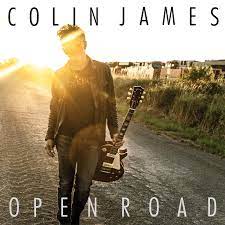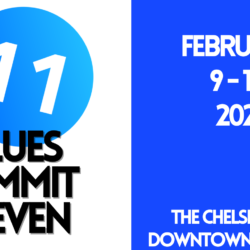Colin James Open Road
Colin James Open Road True North Records
It’s reassuring, if not beyond pride-swelling, to watch a true Canadian talent getting better and better at their craft with each successive release. And, as popular as his Little Big Band was to so many, this writer never felt that James has ever truly maximized his definitive guitar talents, as readily identified by once-mentor, Stevie Ray Vaughan. Yet, here’s another strong release that moves him ever closer to doing so.
Leading off with a jewel from the Tony Joe White catalogue, “As the Crow Flies” (from ‘72’s The Train I’m On) James takes care of guitars, slide and most vocals, adding a core band of Geoff Hicks, drums; Norm Fisher, bass and Simon Kendall on organ & clavinet. Less swampy, more rocky, the tune emphasizes its bluesy roots – with (likely) Steve Marriner on harmonica and underlining James’ inimitable guitar tone.
Without making a giant jump, James’ cover of Albert King’s “Can’t You See What You’re Doing To Me” adds Steve Hilliam on both tenor and baritone saxes and Chris Caddell on rhythm guitar. A natural for James’ crying guitar, his oft-unheralded vocals are exceptional here as the band steps up to the material. Fisher’s bassline is of special note as James’ guitar doesn’t have all the fun. Cue some Magic Sam and it’s no surprise why “That’s Why I’m Crying” is putty in James’ hands, with Chris Caddell added on rhythm guitar. Updated and drenched with emotion, it’s a true highlight and we’ve barely begun. Single and original, co-written with Craig Northey (of Odds fame), “Open Road” makes for a powerful title track, with its distinctively aggressive guitar lines layered over a surprisingly laidback groove. “Change It”, from Doyle Bramhall’s ’94 debut, follows the same slinky, bar-rock feel of the original while one of two co-writes with Colin Linden, “Raging River” – last heard on Linden’s Raised By Wolves – benefits from the deft interplay between these two gifted guitarists on one beautiful, relaxed track.
On another co-write, this one with Tom Wilson, “When I Leave This House” delivers a rockin’, Chuck Berry feel with the addition of Jesse O’Brien on piano. Otis Rush’s “It Takes Time” is fully fleshed out with the addition of Steve Marriner on harmonica, plus Jerry Cook and Steve Hillium on baritone saxophone/tenor saxophone, respectively. For fans of James with horns, this is a return to form.
The second Linden co-write is the stripped down, highly feral blues track, “There’s A Fire”. James burns like this in his sleep when he wants to – and should do it more often. This is a keeper. Mixing things up with the Bob Dylan/Jim James “Down On The Bottom”, Craig Northey joins in on guitar and vocals. Good as this song is with its rich slide and sax accompaniment, it seems an odd fit here (no pun intended).
Likewise, another Dylan cover, “It Takes A Lot To Laugh, It Takes A Train To Cry”, seems another questionable selection to fit the flow of this record, despite the big production values and sax support. The trio of James, Hicks and Fisher turn in a tasteful twist on a Folk Song-era John Lee Hooker song, “Bad Boy”, highly loyal to Hooker’s drone-like, rhythmic trance-like style. “I Love You More Than Words Can Say” – a song made famous by both Otis Redding and Aretha Franklin, written by Booker T. Jones and Eddie Floyd, seems – again – a somewhat strange fit here – disjointed as it is from the flow of the album’s first half. Still, it’s a stunning rendition featuring a soulful vocal from James, stand-out organ from Simon Kendall, piano by Jesse O’Brien and Steve Pelletier on bass. James also provides some sweet guitar stings along the way. Jeremy Wilson’s “Heaven Knows Your Name”, expertly covered by Blackie & The Rodeo Kings back in ‘04, closes this set – as strange an ending as the last few tracks have seemed. Yet, it – too – gets a stunning treatment from James (and with no recording info, it’s difficult to tell who the players might be). Blame the pandemic for the slight lack of continuity, perhaps. At the same time, we’ve learned that recording challenges often turn to opportunity. The product of three band sessions in Vancouver, the rest of Open Road was done remotely.
All in all, it’s another landmark release and a sensational addition to James’s substantial catalogue. Fans will enjoy its deep blues, its rootsy pop, its smart, soulful covers and its everything-in-between. (Eric Thom)










